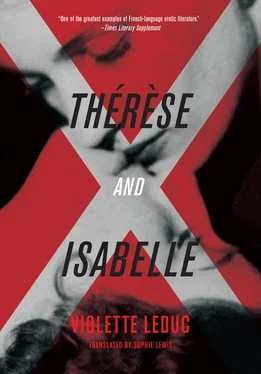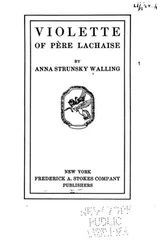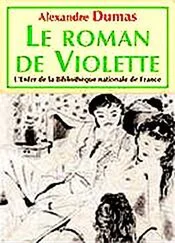Yet for Leduc, being recognized by this elite subset didn’t constitute a fully satisfying form of success — in part because she was poor and desperate to earn money from her writing, in part because she hungered for wider recognition.
Her first book, L’Asphyxie , translated as In the Prison of Her Skin , appeared in 1946, but it was only with the publication of La Bâtarde in 1964 when she was fifty-seven years old, that she found a larger reading public (at least in France), and with it a measure of financial stability. Until this success, she endured, as best she could, what was for her the extremely painful task of finding contentment in the admiration of a small number of readers.
To say that her early books sold poorly would be an understatement. There is a passage in her posthumously published volume, La Chasse à l’amour (“The Hunt for Love”), in which Leduc recounts the moment when she received a letter from her publisher, Gallimard, informing her that the remaining unsold copies of L’Asphyxie were about to be pulped:
A letter from my publisher. Could it be good news? “My publisher.” Who are you kidding. He’s Proust’s publisher. There’s a clear difference between a cathedral of hawthorns and a louse coated with excrement. Let’s open the envelope. My God!. . They are going to pulp the remaining copies of L’Asphyxie . My book is dying. It never even really had a life. No one read it. Today is a day of mourning. I have lost a child. . The editor has run out of storage space. Did it really take up so much room in his cellars, my scrawny little kid? (Leduc 1994, 142–43)
A bit later on in the same passage from La Chasse à l’amour , Leduc realizes that Gallimard is actually offering her the chance to buy the remaining copies of L’Asphyxie at a reduced rate, and she imagines what she might do if she were able to afford to purchase all the copies Gallimard was about to destroy:
I read the letter again. I hadn’t understood it fully. I have the chance to buy all the unsold copies before they are disposed of. There are 1,727 copies left. What will I do with them? Religious tracts. I’ll ring doorbells and hand them out. They’ll turn their dogs on me. Who believes in generosity any more? I’ll sneak them into the bins of the booksellers that line the banks of the Seine before they even notice I’ve done it. I will go to the bookstore La Hune and, fraudulently, I will place a single copy on their shelves for the letter L. I will sing “Death, where is your sting?” as I leave La Hune. (143–44)
Leduc imagines buying her own books from her publisher and then sneaking them into places where, if someone should buy them, the profits (at least the financial ones) would not be hers. If she calls this a form of fraud it is hardly because she is swindling anyone financially, but rather because she apparently feels her books would not have legitimately earned the right to be on the bookstore shelves where she herself would have placed them.
Gallimard would once again return L’Asphyxie to print after Leduc’s 1964 success with La Bâtarde . It remains in print today. Leduc would also receive a similar letter from Gallimard regarding the fate of the 1,473 remaining copies of her second book, L’Affamée. At the bottom of the letter she wrote, in response, “Pulp them! Pulp them!” Her biographer, Carlos Jansiti, displays and reads from this letter in the recent documentary about Leduc, Violette Leduc: La Chasse à l’amour .
Leduc has become known as the author of books, fictional and autobiographical to varying degrees, ( Ravages, Thérèse and Isabelle, La Bâtarde ) which include scenes recounting sexual relations between women in vivid detail. Her books also include accounts of her unrequited love for a series of gay men (including Maurice Sachs, Jean Genet, and Jacques Guérin); her physical and emotional feelings for Simone de Beauvoir (never reciprocated across the several decades of their friendship — a word that perhaps cannot quite do justice to the odd and unbalanced relation they had); as well as her marriage and divorce, and her subsequent friendships and romantic relationships with a number of men. Illegitimacy (Leduc’s mother became pregnant with her by the son of a family for whom she was working) is at the heart of Leduc’s personal and professional self-image. When she was in literary company, she often had difficulty fully accepting that she belonged where she was. In her writing, this self-doubt comes to be intimately tied to her sense of the unruliness of her own sexuality — an unruly sexuality that often provides the material about which she writes. Fascinated by sexual outsiders of many kinds, it does not seem that the categories that other people used to talk about her sexuality, or about sexuality in general, had much pertinence for her.
Consider the extraordinary letter she writes to de Beauvoir in late summer of 1950 about her feelings both for de Beauvoir and for a couple of women who run the hotel in which she is staying in the village of Montjean:
That you should not love in the way that I love you is well and good, since that way I will never grow tired of adoring you gravely. My love for you is a kind of fabulous virginity. And yet I have passed through, and am still in the midst of, a period of sexual frenzy. . I have been obsessed by, hounded by, that couple of women I wrote you about. I have been humiliated, revolted. They have found in this village, they have made real a union, whereas I have for 15 years been consumed by, and am still consumed by solitude. I have often felt as if I were in Charlus’s skin as I spied on them, as I envied them, as I imagined them. They never even spend 15 minutes apart, and I often cry with rage and jealousy when I notice this fact. They are mistrustful, they are shut up inside their happiness. One night I told them, after all the people summering here had left, I told them in very nuanced terms that I loved you and about your beautiful friendship for me. It was a one-sided conversation. I gave, but got nothing in return. They are even more extraordinary than Genet’s “Maids.” The difference in their ages — I have also already told you about this, one is thirty, the other fifty-six — is something I find enchanting and consoling. . How simple they are, I keep coming back to this, how unrefined, how sure of themselves. The younger one has the face of a brute. Their fatness is the weight of sensuality. When seated they open their legs wide, like soldiers, whereas so-called normal women keep them crossed or closed tight. They are a torment to me without even knowing it but they also intensify my love for you because you are a part of the disaster that I am. I often think about lesbians in their cabarets, who exist on another planet, who are nothing but sad puppets. (Leduc 2007, 174–75)
The letter is typical of Leduc in all her idiosyncrasy: verging here and there toward the preposterous without ever quite tipping over into it, excessive in its emotivity, self-consciously obsessive, and profoundly curious both about the way sexuality functions (which doesn’t mean she can’t make the odd homophobic remark), and about the lack of fit between her sexuality and everyone else’s (in this case, de Beauvoir’s, the two women she describes, and lesbians who frequent queer bars and cabarets). She is attentive to a number of characteristics, axes of variations in sexualities we might say, that aren’t always factored into typical discussions of sexuality: that sexualities have a class or regional component; that age difference is important in some sexualities; that girth can have a relation to gender and to sexuality; that sexualities such as her own and that of this couple of women are often best understood by way of representations from the world of literature (Genet’s two maids), and that the representations chosen can sometimes rely on transgendered forms of identification (her link to Proust’s character, Charlus).
Читать дальше











